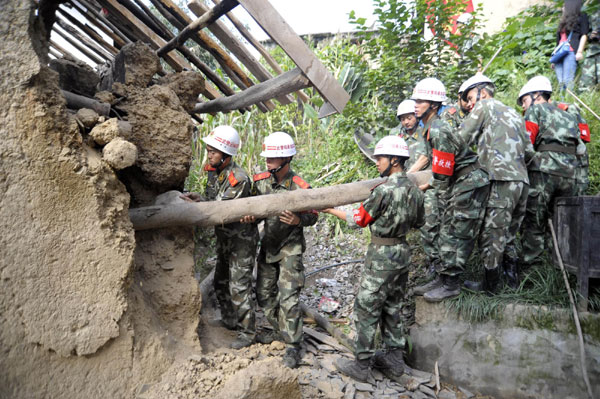YILIANG, Yunnan - Chi Kuanyan could not help crying after she was asked why her parents did not take her home after the 5.7-magnitude earthquake last Friday.
The earthquake, which claimed 81 lives in Southwest China's Yunnan province, toppled her family's home in Kuiyang village, Kuixiang town. Her parents, who were working at a factory in East China's Zhejiang province, did not return to see Chi and her sister because of the cost of traveling.
 |
|
Soldiers help demolish damaged houses after earthquake in Yiliang county, Yunan province, on Sept 15, 2012. [Photo/Xinhua] |
Chi, 17, a Grade 12 student of Yiliang County No 1 Middle School, has only seen her parents twice in the past seven years.
Struggling to support the family, Chi's parents went to the east when she was 10. Chi's parents send 5,000 yuan ($788.6) each year for her and her 15-year-old sister for tuition and a living allowance.
Without a cell phone, Chi was not able to get in touch with her other sister, who is eight, or her grandpa in the village after the earthquake.
Like Chi's family, many villagers in Yiliang county live in tile-roofed houses or thatched cottages on the hillside, which are not strong enough to stand an earthquake. They are also prone to landslides and rolling stones.
Chi's parents contributed to the economic boom in East China over the last decade but their home province of Yunnan in Southwest China, lagged behind. The devastating earthquake has revealed the rising disparity between China's east and west.
Yiliang county, situated in a narrow valley surrounded by mountains, is among the poorest counties in Yunnan province.
The area of flat land, which is suitable for farming and construction, makes up only two percent of the total land in Luozehe town, the worst-hit town near the epicenter, said Tang Hu, the town committee secretary of the Communist Party of China.
The average per capita income for rural residents in the town was 2,788 yuan in 2011, less than 40 percent than the national average, said Tang. Their major income comes from planting corn and pepper.
Yet the average per capita income for rural residents in Zhejiang province, which has a strong private economy, was 13,071 yuan in 2011, almost five times that of Luozehe town.
Different incomes have led to different structures of houses in the countryside, shabby tile-roofed houses in Yiliang compared to popular two-storey villas in Zhejiang.
The poor infrastructure, including roads, hospital, transportation and electric supply also reflect the weak coffers of Yiliang county, which reaped only 400 million yuan in revenue in 2011.
